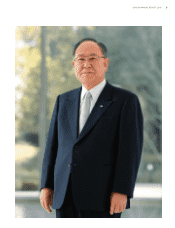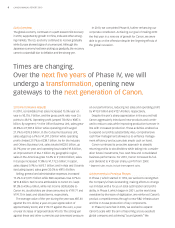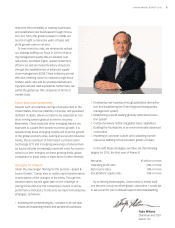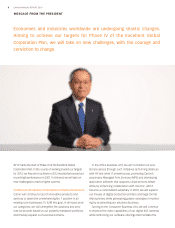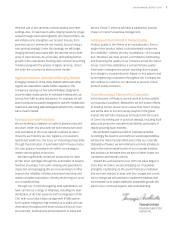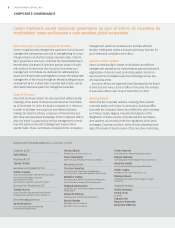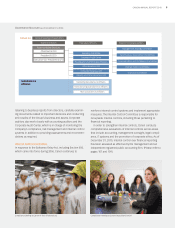Canon 2010 Annual Report Download - page 13
Download and view the complete annual report
Please find page 13 of the 2010 Canon annual report below. You can navigate through the pages in the report by either clicking on the pages listed below, or by using the keyword search tool below to find specific information within the annual report.
CANON ANNUAL REPORT 2010 11
of the General Meeting of Shareholders respectively, unless
the amount or calculation method is provided under the
Articles of Incorporation. As the Articles of Incorporation of
the Company do not provide an amount or calculation meth-
od, the amount of compensation for the directors and corpo-
rate auditors of the Company is determined by a resolution of
the General Meeting of Shareholders. The allotment of com-
pensation for each director from the total amount of compen-
sation is determined by the Company’s Board of Directors,
and the allotment of compensation to each corporate auditor
is determined by consultation among the Company’s corpo-
rate auditors.
3. Audit Committee
The Company avails itself of paragraph (c)(3) of Rule 10A-3 of
the Security Exchange Act, which provides that a foreign
private issuer which has established a board of corporate
auditors shall be exempt from the audit committee require-
ments, subject to certain requirements which continue to be
applicable under Rule 10A-3.
Pursuant to the requirements of the Corporation Law, the
stockholders elect the corporate auditors by resolution of a
general meeting of shareholders. The Company currently has fi ve
corporate auditors, although the minimum number of corporate
auditors required pursuant to the Corporation Law is three.
Unlike the NYSE Corporate Governance Rules, Japanese
laws and regulations, including the Corporation Law, do not
require corporate auditors to be experts in accounting or to
have any other area of expertise. Under the Corporation Law,
a board of corporate auditors may determine the auditing
policies and methods for investigating the business and
assets of a company, and may resolve other matters concern-
ing the execution of the corporate auditor’s duties. The Board
of Corporate Auditors prepares auditors’ reports and may
veto a proposal for the nomination of corporate auditors,
accounting auditors and the determination of the amount of
compensation for the accounting auditors put forward by the
Board of Directors.
Under the Corporation Law, the half or more of a compa-
ny’s corporate auditors must be “outside” corporate auditors.
These are individuals who are prohibited to have ever been a
director, executive offi cer, manager, or employee of the
Company or its subsidiaries. The Company’s current corpo-
rate auditor system meets these requirements. Among the
fi ve members on the Company’s Board of Corporate Auditors,
three are outside corporate auditors. The qualifi cations for an
“outside” corporate auditor under the Corporation Law are
different from the audit committee independence require-
ment under the NYSE Corporate Governance Rules.
4. Shareholder Approval of Equity Compensation Plans
The NYSE Corporate Governance Rules require that shareholders
be given the opportunity to vote on all equity compensation
plans and any material revisions of such plans, with certain
limited exceptions. Under the Corporation Law, a company is
required to obtain stockholder approval regarding the stock
options to be issued to directors and corporate auditors as part
of remuneration of directors and corporate auditors.
after receiving reports on information that might need to be
disclosed from the person in charge of the disclosure working
group at each headquarters.
Countering Antisocial Forces
Canon has formulated a basic policy stipulating that no Canon
Group companies shall maintain relationships of any kind with
antisocial forces that represent a threat to social order and
security. To uphold this basic policy, Canon has established
a department dedicated to activities aimed at countering such
parties while reinforcing cooperative ties with applicable public
authorities. In addition, Canon’s Employment Regulations include
a clause prohibiting such relationships, and the Company con-
tinues to step up efforts to ensure strict employee adherence.
Risk Management
As Canon pursues business expansion in various fi elds on a
global scale, the business and other risks to which it may be
exposed continue to diversify. With the goal of eliminating such
risks altogether, while honoring the trust placed in it by its
stakeholders, Canon works diligently to avoid or minimize its
exposure, to this end assigning specifi cally designated man-
agement committees to address key issues.
In particular, the Executive Committee and various manage-
ment committees engage in careful discussions regarding
signifi cant risk factors. The Corporate Audit Center preemp-
tively identifi es risk factors through audit activities. Also, Canon
formulates in-house rules to guard against those risks and, in
accordance with the policies formulated by the Internal Control
Committee, strives to identify and assess relevant risks associ-
ated with individual business processes.




